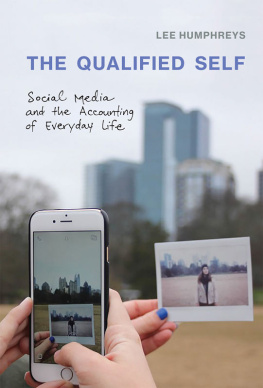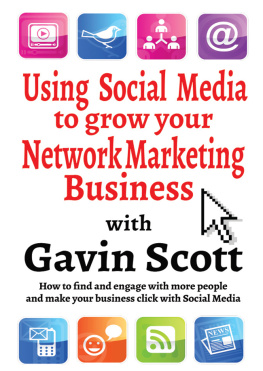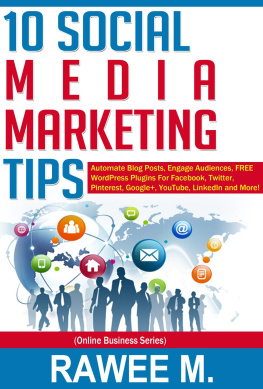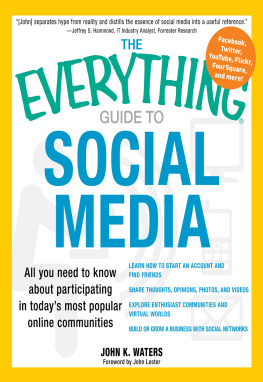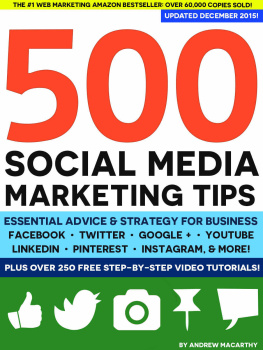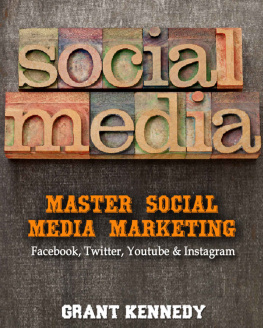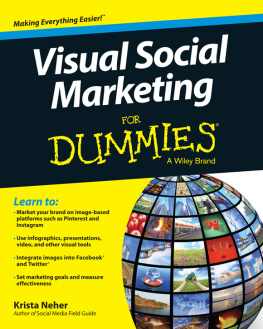The Qualified Self
Social Media and the Accounting of Everyday Life
Lee Humphreys
The MIT Press
Cambridge, Massachusetts
London, England
2018 Massachusetts Institute of Technology
All rights reserved. No part of this book may be reproduced in any form by any electronic or mechanical means (including photocopying, recording, or information storage and retrieval) without permission in writing from the publisher.
This book was set in Stone Serif by Westchester Publishing Services. Printed and bound in the United States of America.
Library of Congress Cataloging-in-Publication Data
Names: Humphreys, Lee, author.
Title: The qualified self : social media and the accounting of everyday life / Lee Humphreys.
Description: Cambridge, MA : MIT Press, [2018] | Includes bibliographical references and index.
Identifiers: LCCN 2017038167 | ISBN 9780262037853 (hardcover : alk. paper)
Subjects: LCSH: Information technology--Social aspects. | Social media. | Diaries--Social aspects. | Self--Social aspects. | Identity (Psychology) and mass media.
Classification: LCC HM851 .H856 2018 | DDC 302.23/1--dc23 LC record available at https://lccn.loc.gov/2017038167
This book is dedicated to my parents, with love, always.
Contents
List of Illustrations
Photo of authors son and husband
Photo of travel journal from 1952
Facebook memory prompt
My School Years multipicture frame
Map of Dodgeball check-ins
Preface
Ive been studying mobile phone use since 2001. And there have been concerns about rude behavior and mobile phones ever since they came on the market. Early on people were concerned about the seemingly oblivious nature of people often ignoring others and speaking loudly on cell phones in public spaces, due to poor receptionsomething they used to call cell-yell. It seemed that the less people could hear the person on the other end of their phone, the louder they spoke. I cant hear you. Can you hear me? How about now? I think I lost you. Can you hear me now? was a common refrain heard across the streets of America as people tried to make cell phone calls despite shoddy service. In fact, throughout much of the early 2000s, Verizon used Can you hear me now? Good, as the tagline in their TV ads, suggesting that their cell phone coverage was much better than AT&Ts. As mobile service overall improved, concerns about cell-yell have gone away, but concerns about inappropriate behavior remain.
Today, when we think about obnoxious mobile phone behavior, an image of a person taking a selfie is likely to pop up. Yes, the selfie has become the poster child for what it means to own a mobile phone. It has become a societal concern. The selfie represents our fear that mobile phones and social media to which selfies are often shared, are encouraging a kind of narcissism. Indeed, there are lots of jokes made about how social media platforms are fundamentally forms of me-promotion. People on Facebook say like me, people on Twitter say listen to me, people on LinkedIn say hire me, people on YouTube say watch me, people on Pinterest say show me, people on Instagram say look at me, people on blogger say agree with me, and people on Tumblr say accept me.
We are concerned that as a society we are becoming more narcissistic. And mobile and social media are contributing to this. We no longer fall in love with our reflection in the pool of water like Narcissus did. We have fallen in love with our image reflected back to us in our filtered mobile devices. Or, if we arent concerned about our own narcissistic tendencies, then we are concerned that others are becoming more narcissistic, especially the younger Me generation Mobile and social media devices and platforms are seen as encouraging a kind of self-obsession.
But I want to suggest that mobile media are not the root evil contributing to a self-obsessed society. Instead, I want to convince you that mobile and social media are part of a much longer story of the ways people use media to catalog their lives and share it with others. I argue that this is a long-standing human practice and there isnt necessarily anything pathological about writing about or taking pictures of yourself and sharing them with others. In fact, its how people have accounted for everyday life for centuries.
Where the Book Comes From
I grew up on a family farm in upstate New York. When I say family farm, I mean that it was started by my great-grandfather. His two sons took over the farm. Each of them had two sons who then took over the farm; my dad was one of the four cousins. We all lived on the same street where the farm was. I grew up in the house that my father had grown up in and where he and my mom still live today. Growing up, I was surrounded by family. My parents used to joke they never had to worry about us having a party when they were out because there was enough family around to take notice. Growing up in this environment was amazingidyllic, really. But growing up with so much of the family around meant that what was personal or private was also collective. I knew what ailed my aunt, of course, because we would bring over dinner to help out. There was our family: my parents, my two brothers, and I; and then there was the family. What I understood to be work life blurred with home life. My dad had lunch at home every day. He didnt go into an office; he went into the fields. As kids, we would play in the fields and the barns where our dads worked. That just seemed natural to me. So when information technology tensions emerged regarding the new blurring of home and work, I found that framing troublesome. Having grown up on the farm, those divisions had never been clear. Of course, work and home lives were blurred. They always have been for family farmers. This isnt to say there werent other divisions on the farm. On the contrary, there were very clear gender roles within the family. But my experience on the family farm never fit with notions of industrialization or the clear distinction between public and private quite in the same way as I was reading in Jrgen Habermass or Richard Sennets work in graduate school. Part of why I embarked on this project is to acknowledge, explore, and reconcile my own personal experiences of family and work and to help me to better understand contemporary notions of public and private, collective and personal.
I am trained as a media and communication scholar. My research over the past fifteen years has primarily examined how people use mobile and social media in their everyday lives. My PhD advisor, Carolyn Marvin, helped to instill in me a historical sensibility. Therefore, I have often drawn on a variety of historical and sociological literature to better understand social processes for interaction with new media. Fundamentally, in this book I wanted to develop a framework for thinking about how we use media, both new and old. Media accounting is my attempt to explain what people do with mobile and social media. As a historically informed scholar, I also want to suggest that media accounting is a long-standing media practice.
My new media research has been empirically grounded. I primarily do interviews and observations with mobile and social media users. I also analyze the content of messages they produce. My understanding of historical media practices primarily comes from the scholarship of historians, feminists, and literary scholars. That said, I have conducted primary research using historical texts, most often nineteenth-century North American diaries and letters, with a particular focus on the writings of women. Throughout the book, I draw on both primary and secondary sources to explicate the media accounting practices. In some cases, I have published on the data previously and note this where applicable.

